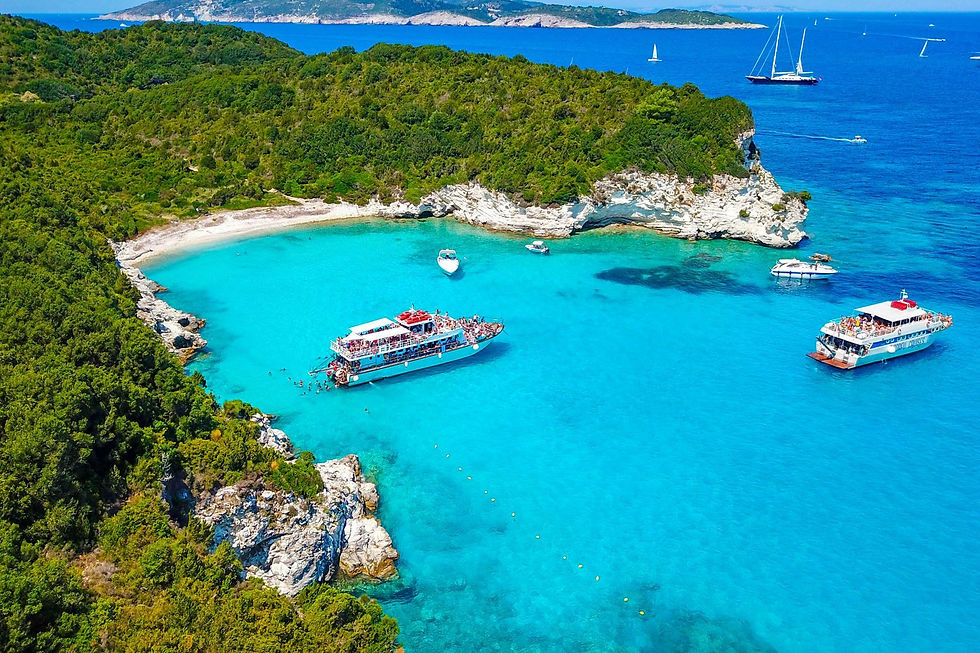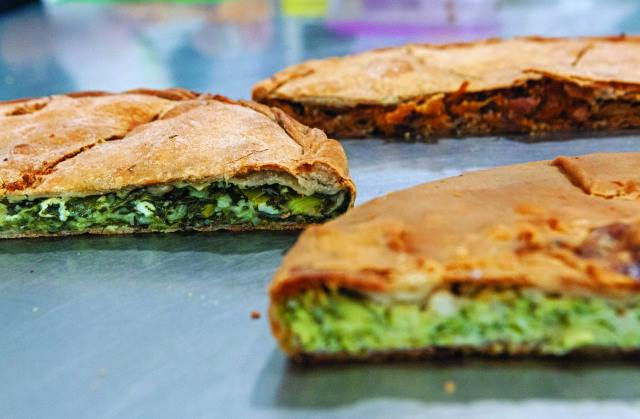
IONIAN ISLANDS


INTRODUCTION
The six core Ionian islands, shepherding their satellites down the west coast of the mainland, float on the haze of the Ionian Sea, their lush green contours, a result of heavy winter rains, coming as a shock to those more used to the stark outlines of the Aegean.
The west coasts of the larger islands also boast some of Greece’s most picturesque cliff-backed beaches, whose sands are caressed by a band of milky turquoise water leading to the deeper azure sea. With their cooler climate, abundant olive and cypress trees, and forested mountains, the Ionians are a lighter, greener variation on the Greek template.
HISTORY
The islands were settled by Greeks at an early date, possibly as early as 1200 BC, and certainly by the 9th century BC. The early Eretrian settlement at Kerkyra was displaced by colonists from Corinth in 734 BC. The islands were mostly a backwater during Ancient Greek times and played little part in Greek politics. The one exception was the conflict between Kerkyra and its mother-city Corinth in 434 BC, which brought intervention from Athens and triggered the Peloponnesian War.
Ithaca was the name of the island home of Odysseus in the epic Ancient Greek poem the Odyssey by Homer. Attempts have been made to identify Ithaki with ancient Ithaca, but the geography of the real island cannot be made to fit Homer's description. Archeological investigations have revealed findings in both Kefalonia and Ithaca.

CLIMATE
The climate of the Ionian islands is characterized by mild winters and cool summers. Due to their pleasant weather conditions, thousands of people visit these islands as they are ideal for summer activities and sailing trips in the Ionian Sea. The winter is not heavy and temperatures rarely fall below zero, even in January.
The frequent rainfall causes the lush vegetation which characterizes the islands. It rarely snows though. The summer is cool and the temperature rarely rises over 39oC even in the hottest days of summer. The islands have high levels of humidity due to the southeastern winds and the frequent rains, which is a common feature for all the Ionian islands. These weather conditions favor the fertility of the land and create natural beauty. One of the islands where it rains the most is Corfu.
HIGHLIGHTS
The largest island in the Ionian Sea. Unforgettable images on Kefalonia start with your first glimpse of the hamlet of Assos and its Venetian castle, almost overgrown with pines and cypresses, followed by delightful Fiskardo and the ‘rival’ towns of Argostoli and Lixouri. For natural wonders, don’t miss the caves: Drogarati, 150 million years old, and Melissani with its underground lake. • Visit Assos Village • Myrtos Beach (often rated as the best in Greece) • Mount Aenos • Agios Gerasimos Monastery • Melissani Cave • Argostoli Harbour • Fiscardo Harbour • Agios Georgios Castle • Drogorati Cave • De Bosset (Drapano) Bridge

KEFALONIA ISLAND
Home of the Loggerhead Turtle. The sea and coast around Zante were picked for Greece’s first marine park. This is where the rare caretta caretta sea turtles lay their eggs. In spring, these endangered creatures set off from the Libyan Sea and the southern Adriatic to lay their eggs in the sands of Gerakas, Dafni, Kalamaki, Marathonisi and especially Sakania, east of Laganas. • Navagio Beach (Shipwreck Cove) • Xigia Beach (sulfur hot spring here) • Snorkel / Dive (With Turtles) • Visit The Venetian Castle • The Cliffs of Keri • Sunset Dinner at Taverna Psarou • Porto Azzuro • Agios Dionysius Church

ZANTE ISLAND
The epic island of Odysseus The homeland of Homer’s Odysseus. You’ll want to visit the listed settlement of Kioni and medieval Anogi, built right on a mountain ridge. • Village of Frikes • Visit the Castle of Odysseus • Visit the Cave of the Nymphs • Enjoy the magic of Kathara Monastery • Spend time in an oak forest (Perachori) • Visit the Pyramids of Exogi • Take a walk to the Acropolis of Alalkomenes • Visit the village of Vathy • Gedaki Beach • Filiatro Beach

ITHACA ISLAND
An enduring reminder of Venetian times. Corfu’s sights include the islets of Vlaherna and Pontikonisi (Mouse Island), Sidari (with its famous Love Canal beach), Paleokastritsa, Kassiopi, Lefkimmi and also Kouloura and Kalami, made famous by the Durrell brothers’ books. The Old Town of Corfu should be top of your list, with its cobbled alleys, Liston Arcade, Spianada (where you could happen upon a cricket match) and dozens of buildings and monuments left by Venetian, French and British rulers. • Stroll the streets of Corfu Old Town • Admire architecture at Achilleion Palace • Climb Mount Pantokrator • See a shipwreck at Agios Gordios • Travel back in time at the Byzantine Museum of Antivouniotissa • Visit a monastery at Paleokastritsa • Explore the Old Fortress • Discover Angelokastro Castle • Visit Vlacherna Monastery • Take a boat to Pontikonisi (Mouse Island) • Sunbathe on Canal d’Amour Beach • Explore the Archaeological Museum of Corfu • Relax at La Grotta Lounge and Pub • Explore the New Venetian Fortress • Go paragliding over Sidari Beach

CORFU ISLAND
The most sophisticated isle in the Ionian Off Lefkada, the legend of shipping tycoon Aristotle Onassis endures on the islet of Skorpios, opposite Nydri, one of the Ionian’s biggest yachting centres. Here among the most breathtaking sights is the lighthouse at Cape Lefkada and Sappho’s Leap, while the most popular is the Faneromeni Monastery. Traditional Agios Nikitas on the west coast is another favourite, flanked by great beaches. • Porto Katsiki Beach • Egremni Beach • Monastery of Panagia Faneromeni • Nydri Waterfalls • Archaeological Museum of Lefkada • Milos Beach • Kathisma Beach • Cape Lefkatas • Wine Tourism

LEFKADA ISLAND
Crystal-clear beaches of fairy tale beauty Make a point of taking a close look at the castle of Ai Nikolas, a listed monument which was first built in 1423 and is the most famous attraction on the island. It was renovated by Venetians in 1510 according to plans drawn up by none other than Leonardo da Vinci. • Visit Tripitos Arch • Explore Antipaxos • Gaios: charming and insta friendly capital of Paxos. There is a super cute pink church on the harbour • Erimitis Limestone Caves • Inland Villages (Ozias, Fontana etc.) • Erimitis Beach

PAXOS ISLAND

Sofrito, (a veal stew which hails from Venetian times) Pastitsada ((beef cooked in a rich tomato sauce and served with thick pasta) Bourdeto (fish in a spicy tomato sauce) Inouminto, (meaning without water but with lots of fresh grated tomatoes)

CORFU
Rooster in tomato sauce served with pasta and grated ladotyri, and eggplants cooked in a delicious vinegary, garlicky sauce The manestra (a vegetable stew with a velvety egg-lemon finish) is also delicious.

ZAKYNTHOS
Octopus pie, which is to die for.

KEFALONIA
Whitebait pie, that will have you licking your fingers.

LEFKADA
GASTRONOMY
The Ionian islands, or the Heptanese, are nothing if not privileged. With fertile soil, plenty of rain and just the right amount of humidity, anything you plant here takes root and grows. This arability shaped the islands’ rural customs as well as their cuisine, but they were also influenced by the Western powers that held sway here, particularly the Venetians.
Ionian cuisine consists of hearty, rustic gems like (eggplant baked in a tomato sauce with eggs and cheese) and sophisticated dishes once reserved for the nobility, such as sofrito (thinly sliced veal in a delicate garlic sauce). It’s a voluptuous cuisine, filled with sauces and rich with flavor.
The people here celebrate seasonal vegetables, favor a bit of spice, love garlic, tomatoes and parsley, and create unusual dishes with every type of meat.
All this deliciousness can be found, mainly at smaller tavernas in out-of-the-way villages, the humble eateries favored by locals. There are also a handful of restaurants in the capital of each island that respect local ingredients and traditions, and whose chefs are known for presenting the kind of food their mothers and grandmothers prepared at home in their padellas, which is how cooking pots are known in this area.
WHY?
The celebrated beaches of the Ionian Islands


Islands full of myths and colorful traditions

Ideal conditions for water sports and sailing

Delicacies inspired by the history of the Ionian Sea

Kefalonia: the beauty of its caves
Paxos: its enormous footprint

Ithaki: Homer and Agios Nikolaos

Corfu: the liston and spianada square

Zakynthos: the house with its coloro.





